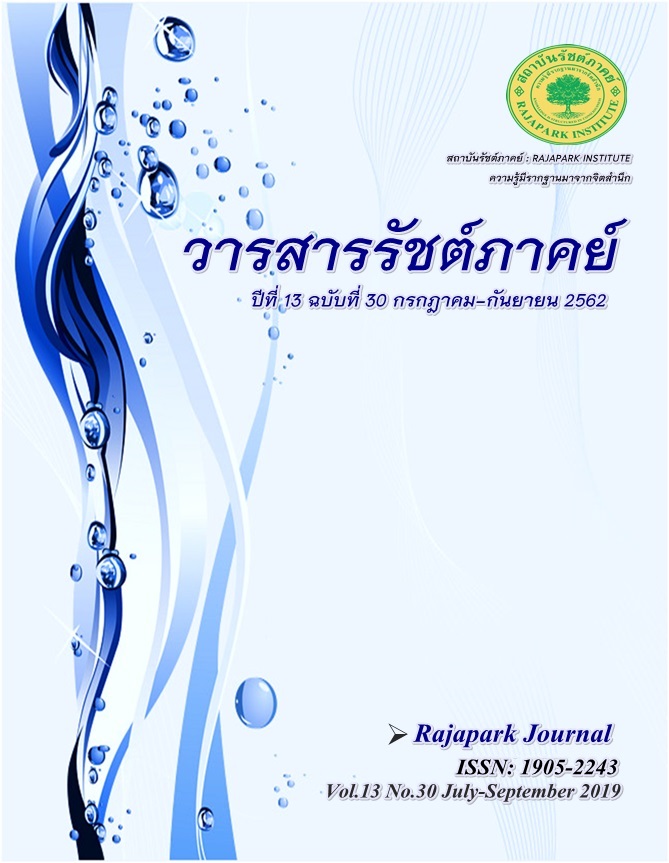Sustainable Tourism Development: A Case Study of Patong Beach Kathu District Phuket Province
Main Article Content
Abstract
The objective of this research is to study the identity of Patong Beach, Kathu District Phuket in terms of the cooperation between the public and private sectors including the civil society for the sustainable tourism development, and the management process of tourism and tourism-related activities in correspondence with the sustainable practices in order to propose the measures to develop and manage the tourism of Patong Beach, Kathu District Phuket. This study is the qualitative study which employs the in-depth interview as the research tool. The interview is conducted with interviewees from the public and private sectors. The result is appropriately formed in which is ensured by the interviewees. The researcher provides and arranges the opinion sharing via the group discussion. The result shows that the organizations attempt to give support and develop the tourism however lack the effective coordination and cooperation between the sectors and no mechanisms to promote the effective communication between the organizations. The proper working platform is the cooperative work from three organizations which are the public and private sectors, and the civil society. The public sector is still a key player in working meanwhile the private sector and civil society plays the role of base which the state agencies use for decision making. The significance of this platform is the core model which implements the Sufficiency Economy by using three pillars and two conditions in order to understand the basis of cooperative working and the sustainable tourism development.
Article Details

This work is licensed under a Creative Commons Attribution-NonCommercial-NoDerivatives 4.0 International License.
Views and opinions appearing in the Journal it is the responsibility of the author of the article, and does not constitute the view and responsibility of the editorial team.
References
English Tourist and the Employment Department Group. (1991). Tourism and the Environment: Maintaining the Balance. London: Glasgow and Associates.
France, L. (1997). The Earthscan Reader in Sustainable Tourism. Guildford: Earthscan.
Goeldner, C. R., & Ritchie, J. R. B. (2011). Tourism: Principles, Practices, Philosophies. (12th ed.). Retrieved September 9, 2017, from https://www.academia.edu/1719960/Tourism_Principles_Practices_Philosophies_12th_Edition
Holden, A. (2000). Environment and Tourism. London: Rutledge.
Lambert, E. E. (2009). Nature Island Tourism: Applying an Eco-Tourism Sustainability Framework to the Island of Dominica. Retrieved August 20, 2010, from https://proquest.umi.com/pqdweb?did=1953820281&sid=3&Fmt-2&clientid-47904&RQT=309&VName=PQD
McIntosh, R. W., Goeldner, C. R., & Ritchie, J. R. B. (1995). Tourism. USA: John Wiley & Sons, Inc.
Middleton, V. T. C., & Hawkins, R. (1998). Sustainable Tourism: A Marketing Perspective. Oxford; Woburn, MA: Butterworth-Heinemann.
Nakarin, P. (2013). Community Participation in Sustainable Tourism Development Case study: Ang Sila Old Market Ang Sila Municipality Chonburi Province. Sukhothai Thammathirat Open University.
National Statistical Office. (2015). Summary of Domestic Tourism Situation 2009-2015. Bureau of Forecasting Statistics. National Statistical Office.
Patong Municipality. (2015). Development strategy plan (2014-2018) Patong Municipality. Policy and plan analysis. Patong Municipality.
Phuket Province. (2015). Provincial Motto. Retrieved September 9, 2017, from https://www.phuket.go.th/webpk/contents.php?str=introduce_word
Swarbrooke, J. (1999). Sustainable Tourism Management. USA: CABI.
Tourism Authority of Thailand. (2015 a). Phuket Province. Retrieved September 9, 2017, from https://www.tourismthailand.org/Where-to-Go/Phuket.
Tourism Authority of Thailand. (2015 b). Top 10 Most Popular Tourist Destinations in Thailand in 2015. Retrieved September 9, 2017, from https://www.tourismthailand.org.
World Tourism Organization: WTO. (2004). Guide for Local Authorities on DEVELOPING SUSTAINABLE TOURISM: A Tourism & Environment Publication. World Tourism Organization, 170-171.


